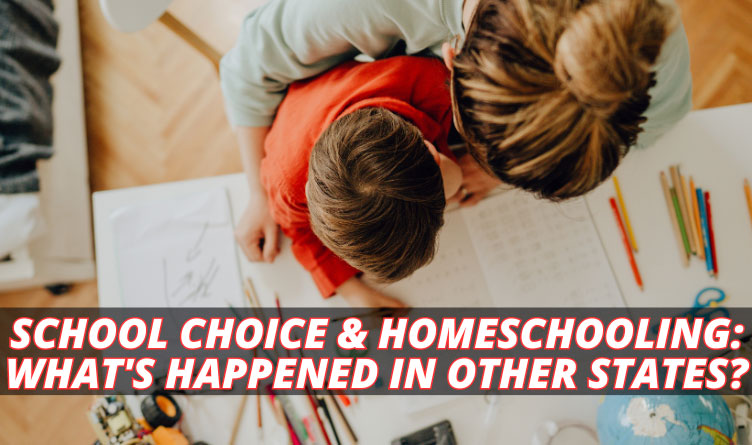Image Credit: Canva
submitted by Shaka Mitchell [Senior Fellow at The American Federation for Children / Tennessee Federation for Children] –
Two streams of educational choice are converging: the growing number of homeschool students and the expansion of educational choice programs like Gov. Lee’s proposed Education Freedom Scholarship Accounts (EFSA).
By now, it is old news that education savings accounts (ESAs) and other educational choice programs have swept across the country and are changing the way states and parents provide education to hundreds of thousands of students. Indeed, just this month new programs have been passed by legislative chambers in multiple states including Alabama, Missouri, and Florida.
These programs could give children the ability to learn in the environment that best fits their unique needs, whether those be private schools, hybrid learning environments, on college campuses, or in the home.
That last category, homeschooling, often receives little attention, but homeschooling is increasingly the choice for parents of all demographics.

According to an analysis done last year, homeschooling has become the country’s fastest growing form of education.
In Tennessee, homeschooling enrollment increased by 77% since the 2017-18 school year. According to U.S. Census data, the largest increase of homeschoolers by race in 2020 was Black households.
The homeschool community is not monolithic and the reasons for choosing to homeschool vary. Some families are concerned about the local school’s environment—factors such as peer pressure or safety. Some students need content that is more advanced than they would otherwise receive in the formal classroom. Some students have extra-curricular pursuits that make a conventional school day difficult.
Whatever their reasons, teaching a child at home is not without cost. There are materials and technology to consider, tutors for more rigorous subject matter, fees for testing or participating in supplemental opportunities like field trips, not to mention the opportunity cost that many parents bear by staying at home and out of the workplace.
All of these are sacrifices that tens of thousands of Tennessee families make annually but the Education Freedom Scholarship Account program presents an opportunity to support these families and make the homeschool experience more accessible for those who can’t currently afford it.
The EFSA would provide roughly $7,000 per pupil to families who choose an option other than their local, public school. The funds could be used for tuition, tutoring, test fees, materials, and many other education-related expenses.
Nevertheless, some members of the homeschool community worry about the loss of autonomy if the EFSA becomes law.
As an attorney who used to work for a firm squarely in the business of suing the government for instances of overreach and regulatory creep, I too have a healthy skepticism of government programs, but there are at least two reasons I think families in Tennessee should welcome the opportunities that the EFSA could bring to the homeschool arena.

First, if the new program passes with homeschool access intact, Tennessee would join other states that have already extended educational choice to homeschoolers. We can look to these states, which include Florida, Arizona, West Virginia, Utah, and even another program in Tennessee, to see how the programs have benefitted homeschool students.
For instance, Jamie Buckland, a West Virginia homeschool parent and founder of the West Virginia Families United for Education says that “traditional homeschoolers are wise to practice caution when legislation is introduced providing public funds for home education. There is additional support these new ESA families will need during this transition, and the statewide homeschool groups shouldn’t be the ones tasked with trying to answer questions regarding a new program.”
At the same time, Jamie is hopeful about the future. “As a 17-year veteran home educator, I am passionate about the opportunity these ESA programs usher in for children who would otherwise be held captive in a learning environment that doesn’t meet their needs. The expansion of school choice does not have to come at the expense of traditional homeschoolers.”
Second, and perhaps most important, if the proposed EFSA legislation becomes law, it will be up to individual families to decide whether they want to participate.
Decisions, especially those about our children, are best managed at the local level, and nothing is more local than the family unit.
Homeschool families in Tennessee already decide whether to educate their children as “independent” homeschoolers or as part of “umbrella schools.”
Parents who are skeptical of government overreach should feel no obligation to participate in the program. Nor should they block families who determine that participation makes sense for their child.
I encourage my fellow, skeptical Tennesseans to follow the lead of equally wary families in other ESA states. Know that your elected officials are taking a “do no harm” approach to the Education Freedom Scholarship program and homeschoolers, then wait to see if the program is right for your family.
If it’s not, nothing will change for you—but if the program operates as we hope it will, you may soon be able to access more support for the crucial task of educating your children at home. That’s a mission we can all get behind.





2 Responses
As a homeschooler from Ca – the state will *always* have strings attached. There will be govt accountability for what you are choosing to teach with govt money. It’s my gut that Tennessee homeschoolers avoid this like the plague.
The government already has the ability to regulate home and private schools, and to be honest, Tennessee has one of the most convoluted and non-protective statues for homeschooling in the country.